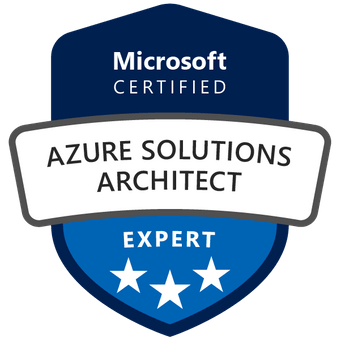
Course Description
This course teaches Azure Solution Architects how to design infrastructure solutions. Course topics cover governance, compute, application architecture, storage, data integration, authentication, networks, business continuity, and migrations. The course combines lecture with case studies to demonstrate basic architect design principles.
Who Should Attend?
Successful students have experience and knowledge in IT operations, including networking, virtualization, identity, security, business continuity, disaster recovery, data platforms, and governance. Students also have experience designing and architecting solutions.
About this course
Course Outline
-
Design identity, governance, and monitoring solutions (25–30%)
-
Design data storage solutions (25–30%)
-
Design business continuity solutions (10–15%)
-
Design infrastructure solutions (25–30%)
-
Design a log routing solution
-
Recommend an appropriate level of logging
-
Recommend monitoring tools for a solution
-
Recommend a solution for securing resources with role-based access control
-
Recommend an identity management solution
-
Recommend a solution for securing identities
-
Recommend an organizational and hierarchical structure for Azure resources
-
Recommend a solution for enforcing and auditing compliance
-
Recommend solutions to allow applications to access Azure resources
-
Recommend a solution that securely stores passwords and secrets
-
Recommend a solution for integrating applications into Microsoft Azure Active Directory (Azure AD), part of Microsoft Entra
-
Recommend a user consent solution for applications
-
Recommend database service tier sizing
-
Recommend a solution for database scalability
-
Recommend a solution for encrypting data at rest, data in transmission, and data in use
-
Recommend a solution for data integration
-
Recommend a solution for data analysis
-
Recommend a solution for storing relational data
-
Recommend a solution for storing semi-structured data
-
Recommend a solution for storing non-relational data
-
Recommend access control solutions to data storage
-
Recommend a data storage solution to balance features, performance, and cost
-
Design a data solution for protection and durability
-
Recommend a recovery solution for Azure, hybrid, and on-premises workloads that meets recovery objectives (Recovery Time Objective [RTO], Recovery Level Objective [RLO], Recovery Point Objective [RPO])
-
Understand the recovery solutions for containers
-
Recommend a backup and recovery solution for compute
-
Recommend a backup and recovery solution for databases
-
Recommend a backup and recovery solution for unstructured data
-
Identify the availability requirements of Azure resources
-
Recommend a high availability solution for compute
-
Recommend a high availability solution for non-relational data storage
-
Recommend a high availability solution for relational data storage
-
Recommend a virtual machine–based compute solution
-
Recommend an appropriately sized compute solution based on workload requirements
-
Recommend a container-based compute solution
-
Recommend a serverless-based compute solution
-
Recommend a caching solution for applications
-
Recommend a messaging architecture
-
Recommend an event-driven architecture
-
Recommend an automated deployment solution for your applications
-
Recommend an application configuration management solution
-
Recommend a solution for API integration
-
Evaluate a migration solution that leverages the Cloud Adoption Framework for Azure
-
Assess and interpret on-premises servers, data, and applications for migration
-
Recommend a solution for migrating applications and virtual machines
-
Recommend a solution for migrating databases
-
Recommend a solution for migrating unstructured data
-
Recommend a network architecture solution based on workload requirements
-
Recommend a connectivity solution that connects Azure resources to the internet
-
Recommend a connectivity solution that connects Azure resources to on-premises networks
-
Optimize network performance for applications
-
Recommend a solution to optimize network security
-
Recommend a load balancing and routing solution
Prerequisites
Before attending this course, students must have previous experience deploying or administering Azure resources and strong conceptual knowledge of:
-
Azure Active Directory
-
Azure compute technologies such as VMs, containers and serverless solutions
-
Azure virtual networking to include load balancers
-
Azure Storage technologies (unstructured and databases)
-
General application design concepts such as messaging and high availability
Where
This will be a virtual event hosted on Microsoft Teams. In the Microsoft Teams platform and sessions, your name, email address, or title may be viewable by other participants. By joining this event, you agree to this experience.
